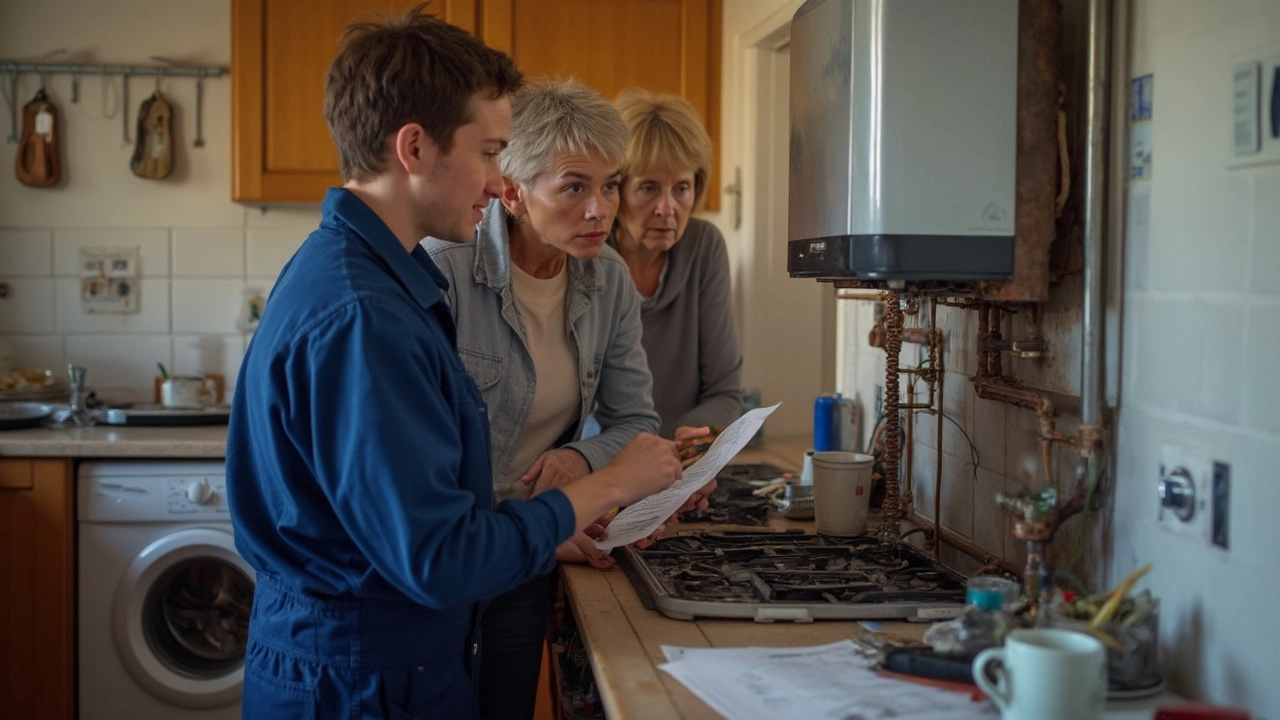Swapping out a boiler isn’t like switching a lightbulb—there’s a lot more to it. First, think about all the pipes hidden behind your walls and floors. Your boiler connects to gas, water, and probably your thermostat too. So, when you schedule a replacement, expect trained engineers poking around more than just your boiler cupboard. Sometimes they find pipes that need updating, or the spot where your new boiler's going simply won’t fit the latest model (yep, that happens a lot in older houses).
If you have pets like my retriever Charlie or cat Luna, plan to keep them away from the work zone. The process can get noisy, and you don’t want curious noses near tools and wires. Most jobs involve turning the heating and water off for at least a day, so if you love hot showers more than I do, that’s something to prepare for. Choosing the right time—maybe not during a cold snap—can make things easier.
- How Much Work Is Boiler Replacement?
- Potential Mess, Disruptions, and Surprises
- Timing: How Long Does It Actually Take?
- How to Make Boiler Replacement Less Stressful
How Much Work Is Boiler Replacement?
Swapping out a boiler is a bigger job than most people expect. It’s not just about swapping old for new. Engineers have to make sure the new unit meets the latest safety rules, actually fits in the space, and works with your existing pipework. Sometimes they have to reroute pipes or upgrade your gas supply just to get things up to standard.
Every house is a bit different. In a modern flat, the replacement might just be a straight, same-for-same switch. But if you live in a house built before the ‘80s, you might be looking at new flue pipes or even updated wiring. Here’s what most boiler replacements generally include:
- Turning off your gas, water, and heating for several hours (or a whole day)
- Draining your central heating system and removing the old boiler
- Checking or upgrading piping to fit the new boiler model
- Mounting and connecting the new boiler
- Testing for leaks and running safety checks
- Commissioning the boiler so your warranty kicks in
The scale of disruption depends on your current setup. For instance, swapping a combi boiler for another combi in the same spot is pretty routine. But replacing a regular boiler system (with tanks in the loft) with a combi means extra time, more mess, and sometimes patching up ceilings or walls afterwards.
| Scenario | Estimated Time | Complexity |
|---|---|---|
| Same type, same location | 1-2 days | Low |
| Different type (e.g. regular to combi) | 2-3 days | Medium |
| Boiler moved to new location | 3+ days | High |
No matter which you need, it’s a proper job that demands certified professionals. Don’t ever try a boiler replacement yourself—legally in the UK, it has to be done by a Gas Safe engineer. The job’s messy, noisy, and if something’s missed, you could be looking at safety issues or voided home insurance. It’s worth getting a written quote and asking clear questions about what’s covered: removal, upgrades, certification, and aftercare should all be spelled out.

Potential Mess, Disruptions, and Surprises
If you've ever had any kind of work done around the house, you know that things rarely go perfectly smooth. Replacing a boiler can get surprisingly messy, especially if you're swapping an old system for a modern one. You might see engineers cutting, drilling, and sometimes even running new pipes along your walls. They usually try to put down dust sheets, but let's be honest—stuff still gets everywhere. Keep cleaning cloths and a vacuum handy.
The real disruption is often about losing your heating and hot water for a bit. Most installations mean you’ll go without either for a full workday, sometimes longer if things take a turn. If you've got kids or pets, it matters—a lot. They might be in the way or just unhappy with all the banging and strange people in the house. Charlie likes to bark at any noise, and Luna will definitely try to sneak into places she shouldn't.
The biggest surprises pop up with older homes, especially if your previous boiler was decades old. It’s not rare for engineers to discover pipes with small leaks, old asbestos flues, or wiring that isn’t up to standard. Any of these can slow the job and add to your bill. In fact, recent UK industry data shows that:
| Common Issue During Replacement | % of Jobs Affected |
|---|---|
| Old pipework needs updating | 23% |
| Asbestos found near boiler | 11% |
| Extra electrical work needed | 15% |
Think you’re good because your system looks tidy? Even modern installs can hit snags if the venting (the flue) isn’t positioned correctly or if parts are out of stock on the day. Always check ahead what’s covered in the quote, so hidden surprises don’t hit your wallet.
- Move valuables and cover up furniture near the work area.
- Ask about how they'll handle any asbestos or mess before work starts.
- Make backup plans for pets and hot water needs.
- Keep your phone handy—the engineer may call about unexpected issues, so being reachable helps clear things up quickly.

Timing: How Long Does It Actually Take?
People always ask, “So, how long before I can get my hot water back?” If it’s a straight swap—old boiler out, new boiler in the same spot—you’re usually looking at about one day of work. Newer combi boilers are designed for these quick turnarounds. You might even have heat by dinnertime.
Things get a bit trickier if your new boiler’s going in a different spot, or you’re upgrading the whole system (like switching from a regular boiler to a combi). That can stretch the job to two, sometimes three days, mainly because of extra pipework or moving gas lines. Expect a bit more disruption if they need to get under floors or into tight corners.
| Type of Boiler Replacement | Typical Time Needed |
|---|---|
| Like-for-like boiler swap | 1 day |
| Combi to Combi (same place) | 1 day |
| Changing location or boiler type | 2–3 days |
| Full system change (tanks removed, new pipework) | 3+ days |
One thing people don’t always consider is paperwork. After the boiler replacement itself, your installer should run safety checks and fill out the required certificates. That doesn’t add much time—usually an hour or so—but it’s important for safety and warranty.
If you’re crunched for time, let the installer know up front. They’ll often try to work around your schedule, sometimes even starting first thing in the morning to get you up and running again before night falls. And if you’ve got kids, roommates, or pets, plan in advance how you’ll handle that day or two without heat or hot water.


